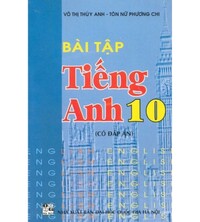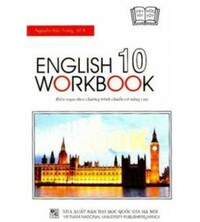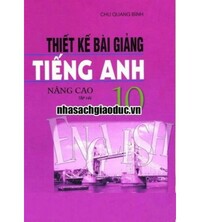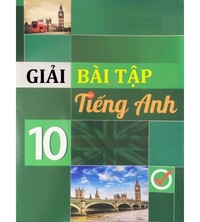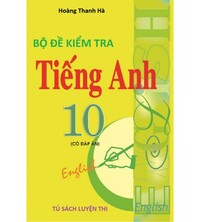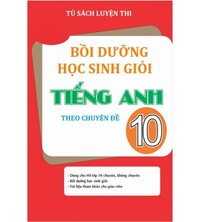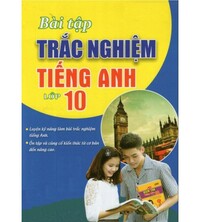Đề thi học kì 1 Tiếng Anh 10 Global Success - Đề số 4
I. Choose the word that has main stress placed differently from the others. II. Choose the word whose underlined part is pronounced differently from that of the others words. III. Mark the letter A, B, C, or D on your answer sheet to indicate the word or phrase that is CLOSEST in meaning to the underlined part in each of the following questions. IV. Mark the letter A, B, C, or D on your answer sheet to indicate the word or phrase that is OPPOSITE in meaning to the underlined part in each of the
Đề bài
I. Choose the word that has main stress placed differently from the others.
1.
A. overspent
B. achievement
C. environment
D. movement
2.
A. congestion
B. organization
C. application
D. communication
II. Choose the word whose underlined part is pronounced differently from that of the others words.
3.
A. incredible
B. advertisement
C. successful
D. audience
4.
A. priority
B. ability
C. community
D. voluntary
III. Mark the letter A, B, C, or D on your answer sheet to indicate the word or phrase that is CLOSEST in meaning to the underlined part in each of the following questions.
5. Volunteers become more concerned and aware of the problems facing the world.
A. obvious
B. worry
C. bored
D. worried
6. Her exceptional ability is known widely as she has won a lot of prizes in many different contests.
A. talent
B. passion
C. admiration
D. apparence
IV. Mark the letter A, B, C, or D on your answer sheet to indicate the word or phrase that is OPPOSITE in meaning to the underlined part in each of the following questions.
7. When you do something good for others, you will find your life hopeful.
A. meaningless
B. hopeless
C. harmful
D. meaningful
8. Ralph Nader was the most prominent leader of the U.S consumer protection movement.
A. casual
B. significant
C. ordinary
D. outstanding
V. Choose the word or phrase A, B, C or D that best completes each sentence below.
9. The final contestants perform on the stage to a television audience.
A. lively
B. likely
C. life
D. live
10. I've been in this city for a long time. I here sixteen years ago.
A. have come
B. was coming
C. came
D. had come
11. His performance was so boring that it made me____________.
A. to disappoint
B. disappointing
C. disappointed
D. disappoint
12. Last night my favorite program __________ by a special news bulletin.
A. interrupted
B. was interrupted
C. were interrupted
D. is interrupted
13. Volunteers for Peace Child Center (VPV) is a __________, non-governmental organization that was founded in 2005 to provide help and education to people in both urban and rural Viet Nam.
A. profit
B. profitable
C. non-profit
D. non-profitable
14. The father typically works outside the home while the mother is __________ domestic duties such as homemaking and raising children.
A. suitable for
B. capable of
C. responsible for
D. aware of
15. He spends most of his time on teaching career. He is a __________ teacher.
A. contributed
B. dedicated
C. caring
D. willing
16. My husband and I both go out to work so we share the .
A. happiness
B. household chores
C. responsibility
D. employment
17. She does work for the Red Cross of her school.
A. voluntarism
B. voluntary
C. voluntarily
D. volunteerism
Choose one underlined word or phrase A, B, C, or D that needs correcting.
18. Disadvantaged children are looking forward to us visiting them soon.
A. are looking
B. us
C. them
D. soon
19. Volunteer work is a great way to gain experienced in a broad range of fields.
A. volunteer work
B. to gain
C. experienced
D. of fields
20. Roles in homemaking and breadwinning can share by family members.
A. roles
B. homemaking
C. can share
D. members
21. A tablet PC is used for surfing the web, sending emails, making phone calls and listen to music.
A. calls
B. A
C. is used for
D. listen
VII. Rewrite each of the following sentences in such a way that it means exactly the same as the original one.
22. Daisy doesn’t intend to go to university after leaving school.
=> Daisy has……………………………………………………
23. They have never seen that film before.
=> This is the first ……………………………………………..
VII. Make the meaningful sentence, using the given words below.
24. While/ Mary /listen/music, / mother /phone/ her.
=> ………………………………………………………………
25. The teacher /not /allow/ us/ use /dictionary /during /test.
=> ………………………………………………………………
VIII. Read the text and choose the correct answer A, B, C, or D.
Chen likes to get his news from the paper. Lemma turns on the television to find out what's going on in the world. Eve subscribes to more magazines than she can keep track of, whereas Kobi chooses to listen to radio talk shows that cover issues thoroughly to tap into what's going on in the world. All these people are touched by the media.
What is the media? What constitutes the media? The media consists of all the ways that news and information is distributed to a mass audience. The media covers everything from hard news, which is investigative reporting to stories that are purely entertaining, such as whether your favorite movie star was on the "Best Dressed/ Worst Dresser list. Whether in print or broadcast on TV, the stories are the product of the reporting of many journalists who write the stories, and editors who give out the assignments, assess the quality of the writing and research, and make the decisions about where and when the stories run.
The news has immediate impact. The Internet puts global news onto the personal computer on your desk. Almost all browsers have links to up-to-the-minute news stories from various news services. You can get constant news updates from a variety of sources via your personal computer, providing you with the most up-to-date and in-depth coverage.
26. According to the writer, __________________
A. people's life can be changed by the media.
B. newspapers, magazines, televisions, radios are all the mass media.
C. people can only get news from the paper.
D. radio talk shows cover thorough issues.
27. According to the passage, the media __________________________
A. spreads not only news but also entertainment to audiences.
B. investigates news reports that will be covered.
C. only distributes hard news to people.
D. consists of news and information all over the world.
28. Which one of the following is not a responsibility of editors?
A. Judge the writings and researches.
B. Assign tasks.
C. Write reports on the stories.
D. Decide when and where tile stories run.
29. The word 'browsers' in line 15 refers to __________________________
A. programs used by computers for doing particular jobs.
B. people who look for information on the Internet.
C. people who design the Web.
D. computer programs that allow users to look at and search through information on the Internet.
30. An advantage of Internet news reports is that _______________________
A. they can be constantly updated.
B. they link news from various news services.
C. they provide a variety of information.
D. they can be put onto the personal computer.
IX. Choose the correct option A, B, C, or D for each gap.
Television now plays such a (an) (31) _____ role in so many people’s life that it is essential for us to decide whether it is good or bad. First of all, television is not only the convenient source of (32) _____, but also a rather cheap one. For a family of four, for example, it is more convenient (33) _____ cheaper to sit comfortably at home than to go out. There is no transport to arrange. They don’t have to pay (34) ____ expensive seats at the theater or in the cinema. All they have to do is to press a button, and they can see plays and films of every kind, not to mention political discussion and the latest exciting football matches. Some people, however, say that this is just where the danger is. The TV viewer needs to do (35) ____. He does not need to use his legs.
31.
A. necessary
B. important
C. detrimental
D. main
32.
A. entertainment
B. music
C. films
D. culture
33.
A. as long as
B. as well as
C. as good as
D. as soon as
34.
A. on
B. in
C. for
D. with
35.
A. one thing
B. everything
C. nothing
D. something
X. Listen again and decide whether the following statements are true (T) or false (F).
36. This is the first International Youth Music Festival.
37. The organisers have finished preparations for the festival.
38. Last year, the festival was held on the beach.
39. They are selling tickets for the festival at the park gates.
40. The country park is far from the town centre.
_____________THE END_____________
Đáp án
HƯỚNG DẪN GIẢI
Thực hiện: Ban Chuyên môn

22. Daisy has no intention of going to university after leaving school.
23. This is the first time they have seen that film.
24. While Mary was listening to music, her mother phoned her.
25. The teacher doesn’t allow us to use dictionary during the test.
HƯỚNG DẪN GIẢI CHI TIẾT
1. A
Kiến thức: Phát âm “-ent”
Giải thích:
A. overspent /oʊvərˈspent/
B. achievement /əˈtʃiːvmənt/
C. environment /ɪnˈvaɪrənmənt/
D. movement /ˈmuːvmənt/
Phần gạch chân đáp án A phát âm là /ent/, còn lại là /ənt/.
Chọn A
2. A
Kiến thức: Phát âm “-tion”
Giải thích:
A. congestion /kənˈdʒestʃən/
B. organization /ɔːrɡənəˈzeɪʃn/
C. application /æplɪˈkeɪʃn/
D. communication /kəmjuːnɪˈkeɪʃn/
Phần gạch chân đáp án A phát âm là /tʃən/, còn lại là /ʃn/.
Chọn A
3. D
Kiến thức: Trọng âm từ có 3, 4 âm tiết
Giải thích:
A. incredible /ɪnˈkredəbl/
B. advertisement /ədˈvɜːtɪsmənt/
C. successful /səkˈsesfl/
D. audience /ˈɔːdiəns/
Trọng âm đáp án D rơi vào âm tiết thứ nhất, còn lại là âm thứ hai.
Chọn D
4. D
Kiến thức: Trọng âm từ có 4 âm tiết
Giải thích:
A. priority /praɪˈɔːrəti/
B. ability /əˈbɪləti/
C. community /kəˈmjuːnəti/
D. voluntary /ˈvɑːlənteri/
Trọng âm đáp án D rơi vào âm tiết thứ nhất, còn lại là âm thứ hai.
Chọn D
5. D
Kiến thức: Từ đồng nghĩa
Giải thích:
concerned (adj): lo lắng, quan tâm/ có liên quan
A. obvious (adj): rõ ràng, hiển nhiên
B. worry (v): làm cho lo lắng, quấy rầy, làm khó chịu
C. bored (adj): chán nản, mệt mỏi
D. worried (adj): lo lắng, lo nghĩ
=> concerned = worried
Volunteers become more concerned and aware of the problems facing the world.
(Tình nguyện viên trở nên quan tâm hơn và nhận thức được các vấn đề mà thế giới phải đối mặt.)
Chọn D
6. A
Kiến thức: Từ đồng nghĩa
Giải thích:
exceptional ability: khả năng đặc biệt
A. talent (n): tài năng, năng khiếu
B. passion (n): sự say mê, niềm đam mê
C. admiration (n): sự khâm phục, sự thán phục
D. appearance (n): diện mạo, bề ngoài, sự xuất hiện
=> exceptional ability = talent
Her exceptional ability is known widely as she has won a lot of prizes in many different contests.
(Tài năng của cô được biết đến rộng rãi vì cô ấy đã giành được rất nhiều giải thưởng trong nhiều cuộc thi khác nhau.)
Chọn A
7. B
Kiến thức: Từ trái nghĩa
Giải thích:
hopeful (adj): hy vọng, đầy hy vọng
A. meaningless (adj): vô nghĩa
B. hopeless (adj): không hy vọng, thất vọng, tuyệt vọng
C. harmful (adj): gây hại, có hại
D. meaningful (adj): đầy ý nghĩa, có ý nghĩa
=> hopeful >< hopeless
When you do something good for others, you will find your life hopeful.
(Khi bạn làm điều gì đó tốt cho người khác, bạn sẽ thấy cuộc sống của mình đầy hy vọng.)
Chọn B
8. C
Kiến thức: Từ trái nghĩa
Giải thích:
prominent (adj): nổi bật, dễ thấy, xuất chúng, lỗi lạc
A. casual (adj): bình thường, tình cờ, tùy tiện
B. significant (adj): quan trọng, đáng kể, đầy ý nghĩa
C. ordinary (adj): thông thường, tầm thường
D. outstanding (adj): nổi bật, đáng chú ý
=> prominent >< ordinary
Ralph Nader was the most prominent leader of the U.S consumer protection movement.
(Ralph Nader là nhà lãnh đạo nổi bật nhất của cuộc vận động bảo vệ người tiêu dùng Hoa Kỳ.)
Chọn C
9. D
Kiến thức: Từ vựng, từ loại
Giải thích:
lively (adj): sống động
likely (adj): có vẻ như/ có khả năng
life (n): cuộc sống, cuộc đời
live (adv): trực tiếp
Sau động từ “perform” cần trạng từ.
The final contestants perform live on the stage to a television audience.
(Các thí sinh cuối cùng biểu diễn trực tiếp trên sân khấu trước khán giả truyền hình.)
Chọn D
10. C
Kiến thức: Thì quá khứ đơn
Giải thích:
Thì quá khứ đơn dùng để diễn tả hành động, sự vật xác định trong quá khứ hoặc vừa mới kết thúc.
Công thức chung: S + Ved/V2
Dấu hiệu: “sixteen years ago” (mười sáu năm trước)
I've been in this city for a long time. I came here sixteen years ago.
(Tôi đã ở thành phố này trong một khoảng thời gian dài. Tôi đến đây mười sáu năm trước.)
Chọn C
11. C
Kiến thức: Tính từ
Giải thích:
Cấu trúc: make + O + adj (làm ai cảm thấy như thế nào)
disappoint (v): làm ai đó thất vọng
disappointed (adj): bị làm cho thất vọng
His performance was so boring that it made me disappointed.
(Màn trình diễn của anh ấy quá nhàm chán đến nỗi làm tôi thất vọng.)
Chọn C
12. B
Kiến thức: Câu bị động
Giải thích:
Cấu trúc câu bị động thì quá khứ đơn: S (số ít) + was Ved/P2 (+ by O)
last night: tối qua => dấu hiệu nhận biết thì quá khứ đơn
Last night my favorite program was interrupted by a special news bulletin.
(Đêm qua chương trình yêu thích của tôi đã bị gián đoạn bởi một bản tin đặc biệt.)
Chọn B
13. C
Kiến thức: Từ vựng, từ loại
Giải thích:
Sau mạo từ “a” và trước danh từ “organization” đã có một tính từ ngăn cách bằng dấu phẩy nên chỗ trống cần một tính từ nữa.
profit (n): lợi nhuận
profitable (adj) : có lợi nhuận
non-profit (adj) : phi lợi nhuận
non-profitable => không tồn tại từ này
Volunteers for Peace Child Center (VPV) is a non-profit, non-governmental organization that was founded in 2005 to provide help and education to people in both urban and rural Viet Nam.
(Trung tâm tình nguyện vì trẻ em vì hòa bình (VPV) là một tổ chức phi lợi nhuận, phi chính phủ, được thành lập vào năm 2005 để giúp đỡ và giáo dục cho người dân ở cả thành thị và nông thôn Việt Nam.)
Chọn C
14. C
Kiến thức: Từ vựng
Giải thích:
A. suitable for: thích hợp, phù hợp
B. capable of: có thể, có khả năng
C. responsible for: chịu trách nhiệm, có trách nhiệm
D. aware of: nhận thức, nhận biết
The father typically works outside the home while the mother is responsible for domestic duties such as homemaking and raising children.
(Người cha thường làm việc bên ngoài nhà trong khi người mẹ chịu trách nhiệm cho các công việc trong nhà như nội trợ và nuôi con.)
Chọn C
15. B
Kiến thức: Từ vựng
Giải thích:
A. contributed (adj): đóng góp, góp phần
B. dedicated (adj): tận tụy, tận tâm
C. caring (adj): chu đáo
D. willing (adj): sẵn sàng, bằng lòng, vui lòng
He spends most of his time on teaching career. He is a dedicated teacher.
(Ông ấy dành phần lớn thời gian cho sự nghiệp giảng dạy. Ông là một giáo viên tận tâm.)
Chọn B
16. B
Kiến thức: Từ vựng
Giải thích:
A. happiness (n): niềm vui, hạnh phúc
B. household chores (n): việc nhà
C. responsibility (n): trách nhiệm
D. employment (n): sự tuyển dụng
My husband and I both go out to work so we share the household chores.
(Chồng tôi và tôi đều ra ngoài đi làm vì vậy chúng tôi cùng chia sẻ việc nhà.)
Chọn B
17. B
Kiến thức: Từ loại
Giải thích:
Trước danh từ “work” cần tính từ.
A. voluntarism = D. volunteerism (n): nguyên tắc hoạt động tình nguyện
B. voluntary (adj): mang tính tình nguyện
C. voluntarily (adv): một cách tình nguyện
She does voluntary work for the Red Cross of her school.
(Cô ấy làm công tác tình nguyện cho Hội chữ thập đỏ sau giờ học.)
Chọn B
18. C
Kiến thức: V-ing
Giải thích:
Cấu trúc: look forward to + O + V-ing (mong chờ ai làm việc gì)
Sửa: bỏ “them”.
Disadvantaged children are looking forward to us visiting soon.
(Các trẻ em khuyết tật đang mong chờ chúng tôi đến thăm sớm.)
Chọn C
19. C
Kiến thức: Từ loại
Giải thích:
Cấu trúc: gain something (đạt được cái gì) => sau “gain” phải là danh từ.
Sửa: experienced (adj): có kinh nghiệm => experience (n): kinh nghiệm
Volunteer work is a great way to gain experience in a broad range of fields.
(Công việc tình nguyện là một cách tuyệt vời để tích lũy kinh nghiệm trong nhiều lĩnh vực.)
Chọn C
20. C
Kiến thức: Câu bị động
Giải thích:
Câu bị động với động từ khuyết thiếu: S + can + be + Ved/PII + by O.
Sửa: can share => can be shared
Roles in homemaking and breadwinning can be shared by family members.
(Vai trò của công việc nội trợ và làm trụ cột gia đình có thể được chia sẻ bởi các thành viên trong gia đình.)
Chọn C
21. D
Kiến thức: Cấu trúc song hành
Giải thích:
Các cụm từ nối với nhau bằng liên từ “and” sẽ có cùng dạng và cùng loại: surfing – sending – making
Sửa: listen => listening
A tablet PC is used for surfing the web, sending emails, making phone calls and listening to music.
(Một chiếc máy tính bảng được sử dụng để lướt web, gửi email, gọi điện thoại và nghe nhạc.)
Chọn D
22.
Kiến thức: Cụm từ đồng nghĩa
Giải thích: don’t/ doesn’t intend to V = have/ has no intention of Ving: không có ý định làm gì
Daisy doesn’t intend to go to university after leaving school.
(Daisy không có ý định đi học đại học sau khi ra trường.)
Đáp án: Daisy has no intention of going to university after leaving school.
23.
Kiến thức: Thì hiện tại hoàn thành
Giải thích:
Cấu trúc: S + have/has + never + Ved/ P2 + before (... chưa bao giờ...trước đây)
= This is the first time + S + have/has + Ved/ P2 (Đây là lần đầu tiên...)
They have never seen that film before.
(Họ chưa bao giờ xem bộ phim đó trước đây.)
Đáp án: This is the first time they have seen that film.
(Đây là lần đầu tiên họ xem bộ phim đó.)
24.
Kiến thức: Thì quá khứ đơn – quá khứ tiếp diễn
Giải thích:
Thì quá khứ tiếp diễn dùng để diễn tả một hành động đang xảy ra trong quá khứ (listen) thì hành động khác xen vào – thì quá khứ đơn (phone).
Cấu trúc: While + S1 + was/ were V-ing, S2 + Ved/ V2 (Trong khi... thì...)
Đáp án: While Mary was listening to music, her mother phoned her.
(Trong khi Mary đang nghe nhạc, mẹ cô ấy đã gọi điện cho cô.)
25.
Kiến thức: V-ing/to V
Giải thích:
allow sb to V: cho phép ai làm gì
Thì hiện tại đơn dạng phủ định: S (số ít) + doesn’t + V(nguyên thể)
Đáp án: The teacher doesn’t allow us to use the dictionary during the test.
(Giáo viên không cho phép chúng tôi sử dụng từ điển trong bài kiểm tra.)
26. B
Kiến thức: Đọc hiểu
Giải thích:
Theo người viết, __________________
A. cuộc sống của mọi người có thể được thay đổi bởi các phương tiện truyền thông.
B. báo, tạp chí, tivi, radio đều là phương tiện thông tin đại chúng.
C. mọi người chỉ có thể nhận được tin tức từ tờ báo.
D. chương trình nói chuyện trên đài phát thanh bao gồm các vấn đề cẩn thận.
Thông tin: Chen likes to get his news from the paper. Lemma turns on the television to find out what's going on in the world. Eve subscribes to more magazines than she can keep track of, whereas Kobi chooses to listen to radio talk shows that cover issues thoroughly to tap into what's going on in the world. All these people are touched by the media.
Tạm dịch: Chen thích lấy tin tức từ báo. Lemma đề bật tivi để tìm hiểu những gì đang xảy ra trên thế giới. Eve đặt mua nhiều tạp chí hơn để cô có thể theo dõi thông tin, trong khi Kobi chọn nghe các chương trình trò chuyện trên đài phát thanh bao gồm những vấn đề để khai thác những gì đang diễn ra trên thế giới một cách cẩn thận. Tất cả những người này chịu tác động bởi truyền thông.
Chọn B
27. A
Kiến thức: Đọc hiểu
Giải thích:
Theo đoạn văn, các phương tiện truyền thông ______________
A. lan truyền không chỉ tin tức mà còn có thông tin giải trí cho khán giả.
B. điều tra các báo cáo tin tức sẽ được theo dõi để lấy tin tức.
C. chỉ phân phối tin nóng cho mọi người.
D. bao gồm tin tức và thông tin trên toàn thế giới.
Thông tin: The media consists of ail the ways that news and information is distributed to a mass audience. The media covers everything from hard news, which is investigative reporting to stories that are purely entertaining, such as whether your favorite movie star was on the "Best Dressed/ Worst Dresser” list.
Tạm dịch: Các phương tiện truyền thông bao gồm tất cả các cách mà tin tức và thông tin được phân phối cho khán giả đại chúng. Các phương tiện truyền thông bao gồm tất cả mọi thứ từ tin nóng, điều mà là những báo cáo điều tra cho các câu chuyện hoàn toàn mang tính giải trí, chẳng hạn như liệu ngôi sao điện ảnh yêu thích của bạn có nằm trong danh sách "Trang phục đẹp nhất / Mặc xấu nhất”.
Chọn A
28. C
Kiến thức: Đọc hiểu
Giải thích:
Một trong những điều sau đây không phải là trách nhiệm của biên tập viên?
A. Đánh giá các bài viết và nghiên cứu.
B. Phân công nhiệm vụ.
C. Viết báo cáo về những câu chuyện.
D. Quyết định khi nào và nơi câu chuyện được viết.
Thông tin: Whether in print or broadcast on TV, the stories are the product of the reporting of many journalists who write the stories, and editors who give out the assignments, assess the quality of the writing and research, and make the decisions about where and when the stories run.
Tạm dịch: Liệu được in hay phát trên TV, các câu chuyện đều là sản phẩm báo cáo của nhiều nhà báo viết truyện và biên tập viên đưa ra các nhận xét, đánh giá chất lượng của bài viết và nghiên cứu, và đưa ra quyết định về việc câu chuyện được viết ở đâu và khi nào.
Chọn C
29. D
Kiến thức: Đọc hiểu
Giải thích:
Từ “browsers” trong dòng 15 đề cập đến ________________
A. các chương trình được sử dụng bởi máy tính để làm các công việc cụ thể.
B. những người tìm kiếm thông tin trên Internet.
C. những người thiết kế trang Web.
D. các chương trình máy tính cho phép người dùng xem và tìm kiếm thông qua thông tin trên Internet.
Thông tin: Almost all browsers have links to up-to-the-minute news stories from various news services. You can get constant news updates from a variety of sources via your personal computer, providing you with the most up-to-date and in-depth coverage.
Tạm dịch: Hầu hết tất cả các trình duyệt đều có liên kết đến các câu chuyện mới, tin tức mới nhất từ các dịch vụ tin tức khác nhau. Bạn có thể nhận được cập nhật tin tức liên tục từ nhiều nguồn khác nhau thông qua máy tính cá nhân của bạn, cung cấp cho bạn phạm tin tức mới và chuyên sâu nhất.
Chọn D
30. A
Kiến thức: Đọc hiểu
Giải thích:
Một lợi thế của các bản tin trên Internet là _____________
A. chúng có thể được cập nhật liên tục.
B. chúng liên kết tin tức từ các dịch vụ tin tức khác nhau.
C. chúng cung cấp nhiều thông tin.
D. chúng có thể được đưa vào máy tính cá nhân.
Thông tin: Almost all browsers have links to up-to-the-minute news stories from various news services.
Tạm dịch: Hầu hết tất cả các trình duyệt đều có liên kết đến các câu chuyện mới, tin tức mới nhất từ các dịch vụ tin tức khác nhau.
Chọn A
Dịch bài đọc:
Chen thích lấy tin tức từ báo. Lemma mở tivi để tìm hiểu những gì đang xảy ra trên thế giới. Eve đặt mua nhiều tạp chí hơn để cô có thể theo dõi thông tin, trong khi Kobi chọn nghe các chương trình trò chuyện trên đài phát thanh bao gồm những vấn đề để khai thác những gì đang diễn ra trên thế giới một cách cẩn thận. Tất cả những người này chịu tác động bởi truyền thông.
Phương tiện truyền thông là gì? Những gì cấu thành các phương tiện truyền thông? Các phương tiện truyền thông bao gồm tất cả các cách mà tin tức và thông tin được phân phối cho khán giả đại chúng. Các phương tiện truyền thông bao gồm tất cả mọi thứ từ tin nóng, điều mà là những báo cáo điều tra cho các câu chuyện hoàn toàn mang tính giải trí, chẳng hạn như liệu ngôi sao điện ảnh yêu thích của bạn có nằm trong danh sách "Trang phục đẹp nhất / Mặc xấu nhất”. Liệu được in hay phát trên TV, các câu chuyện đều là sản phẩm báo cáo của nhiều nhà báo viết truyện và biên tập viên đưa ra các nhận xét, đánh giá chất lượng của bài viết và nghiên cứu, và đưa ra quyết định về việc câu chuyện được viết ở đâu và khi nào.
Tin tức có ảnh hưởng ngay lập tức. Internet đưa tin tức toàn cầu đến máy tính cá nhân trên bàn của bạn. Hầu hết tất cả các trình duyệt đều có liên kết đến các câu chuyện, tin tức mới nhất từ các dịch vụ tin tức khác nhau. Bạn có thể nhận được cập nhật tin tức liên tục từ nhiều nguồn khác nhau thông qua máy tính cá nhân của bạn, cung cấp cho bạn tin tức mới và chuyên sâu nhất.
31. B
Kiến thức: Từ vựng
Giải thích:
A. necessary (adj): cần thiết, thiết yếu
B. important (adj): quan trọng, hệ trọng
=> play an important role: đóng một vai trò quan trọng
C. detrimental(adj): có hại, bất lợi cho
D. main (n): chính, chủ yếu
Television now plays such a (an) (31) important role in so many people’s life that it is essential for us to decide whether it is good or bad.
Tạm dịch: Vô tuyến truyền hình bây giờ đóng một vai trò quan trọng trong cuộc sống của nhiều người mà điều thật cần thiết với chúng ta là quyết định xem liệu nó tốt hay xấu.
Chọn B
32. A
Kiến thức: Từ vựng
Giải thích:
A. entertainment (n): giải trí, sự vui chơi
B. music (n): nhạc, âm nhạc
C. films (n): phim, phim ảnh
D. culture (n): văn hóa, văn minh
First of all, television is not only the convenient source of (32) entertainment, but also a rather cheap one.
Tạm dịch: Trước hết, truyền hình không chỉ là nguồn giải trí tiện lợi mà nó còn khá rẻ.
Chọn A
33. B
Kiến thức: Từ vựng
Giải thích:
A. as long as: miễn là, miễn như
B. as well as: cũng như, thêm vào đó
C. as good as: gần như
D. as soon as: ngay sau khi
For a family of four, for example, it is more convenient (33) as well as cheaper to sit comfortably at home than to go out.
Tạm dịch: Ví dụ, đối với một gia đình bốn người, sẽ thuận tiện hơn cũng như rẻ hơn khi thoải mái ngồi ở nhà hơn là đi ra ngoài.
Chọn B
34. C
Kiến thức: Giới từ
Giải thích:
A. on: trên, ở trên
B. in: ở, tại, trong
C. for: thay cho, dành cho, để, với mục đích
D. with: với, cùng
They don’t have to pay (34) for expensive seats at the theater or in the cinema.
Tạm dịch: Họ không phải trả tiền cho những chỗ ngồi đắt tiền tại nhà hát hoặc trong rạp chiếu phim.
Chọn C
35. C
Kiến thức: Từ vựng
Giải thích:
A. one thing: một điều
B. everything: mọi vât, tất cả mọi thứ
C. nothing: không cái gì, không điều gì
D. something: một điều gì đó, cái gì đó
The TV viewer needs to do (35) nothing.
Tạm dịch: Người xem TV không cần phải làm gì.
Chọn C
Bài đọc hoàn chỉnh:
Television now plays such a (an) (31) important role in so many people’s life that it is essential for us to decide whether it is good or bad. First of all, television is not only the convenient source of (32) entertainment, but also a rather cheap one. For a family of four, for example, it is more convenient (33) as well as cheaper to sit comfortably at home than to go out. There is no transport to arrange. They don’t have to pay (34) for expensive seats at the theater or in the cinema. All they have to do is to press a button, and they can see plays and films of every kind, not to mention political discussion and the latest exciting football matches. Some people, however, say that this is just where the danger is. The TV viewer needs to do (35) nothing. He does not need to use his legs.
Dịch bài đọc:
Vô tuyến truyền hình bây giờ đóng một vai trò quan trọng trong cuộc sống của nhiều người mà điều thật cần thiết với chúng ta là quyết định xem liệu nó tốt hay xấu. Trước hết, truyền hình không chỉ là nguồn giải trí tiện lợi mà nó còn khá rẻ. Ví dụ, đối với một gia đình bốn người, sẽ thuận tiện hơn cũng như rẻ hơn khi thoải mái ngồi ở nhà hơn là đi ra ngoài. Không có thay đổi để sắp xếp chỗ. Họ không phải trả tiền cho những chỗ ngồi đắt tiền tại nhà hát hoặc trong rạp chiếu phim. Tất cả những gì họ phải làm là nhấn một nút, và họ có thể xem các vở kịch và phim đủ thể loại, chưa kể đến họ có thể thảo luận về chính trị và các trận bóng đá hấp dẫn mới nhất. Tuy nhiên, một số người nói rằng đây chỉ là nơi nguy hiểm. Người xem TV không cần phải làm gì. Anh ta không cần phải sử dụng đôi chân của mình.
36. F
Kiến thức: Nghe hiểu
Giải thích:
This is the first International Youth Music Festival.
(Đây là Liên hoan Âm nhạc Thiếu niên Quốc tế đầu tiên.)
Thông tin: Hi, this is Tam at the site of the second International Youth Music Festival.
(Xin chào, đây là Tâm tại địa điểm của Liên hoan âm nhạc trẻ quốc tế lần thứ hai.)
Chọn F.
37. F
Kiến thức: Nghe hiểu
Giải thích:
The organisers have finished preparations for the festival.
(Ban tổ chức đã chuẩn bị xong cho lễ hội.)
Thông tin: We're still setting up the main stage and there's still a lot to do, but we want to get it ready by tomorrow so that the bands can start to practise.
(Chúng tôi vẫn đang dựng sân khấu chính và còn nhiều việc phải làm, nhưng chúng tôi muốn chuẩn bị sẵn sàng vào ngày mai để các ban nhạc có thể bắt đầu luyện tập.)
Chọn F.
38. T
Kiến thức: Nghe hiểu
Giải thích:
Last year, the festival was held on the beach.
(Năm ngoái, lễ hội được tổ chức trên bãi biển.)
Thông tin: Well, last year the festival was on the beach and it was free of charge.
(À, năm ngoái lễ hội ở trên bãi biển và nó miễn phí.)
Chọn T.
39. F
Kiến thức: Nghe hiểu
Giải thích:
They are selling tickets for the festival at the park gates.
(Họ đang bán vé cho lễ hội ở cổng công viên.)
Thông tin: This year we have sold the tickets in advance so that we know how many people are coming.
(Năm nay chúng tôi đã bán vé trước để biết có bao nhiêu người đến.)
Chọn F.
40. T
Kiến thức: Nghe hiểu
Giải thích:
The country park is far from the town centre.
(Công viên nước cách xa trung tâm thị trấn.)
Thông tin:
Tam: Why the country park? Isn't it a bit too far from the town centre?
(Tại sao lại là công viên nước? Nó hơi quá xa trung tâm thị trấn không phải sao?)
Jack: Yeah, that's why we've chosen it.
(Vâng, đó là lý do tại sao chúng tôi đã chọn nó.)
Chọn T.
Bài nghe:
Tam: Hi, this is Tam at the site of the second International Youth Music Festival. There are just two days to go before the festival opens on Sunday. As you can hear in the background it's very busy here. I'm with Jack, one of the festival organisers. So, Jack, how's it all going?
Jack: Hi, we're very busy. We're still setting up the main stage and there's still a lot to do, but we want to get it ready by tomorrow so that the bands can start to practise.
Tam: I heard that there are some changes to the festival this year. Can you tell us about them?
Jack: Well, last year the festival was on the beach and it was free of charge. We didn't know it would be so popular and we had problems with overcrowding. This year we have sold the tickets in advance so that we know how many people are coming. What's more important, we've decided to move the festival to this country park.
Tam: Why the country park? Isn't it a bit too far from the town centre?
Jack: Yeah, that's why we've chosen it. This location is better for everybody because ...
Tạm dịch:
Tâm: Xin chào, đây là Tâm tại địa điểm của Liên hoan âm nhạc trẻ quốc tế lần thứ hai. Chỉ còn hai ngày nữa là lễ hội sẽ khai mạc vào Chủ nhật. Như bạn có thể nghe thấy ở đây rất nhộn nhịp. Tôi đi cùng Jack, một trong những người tổ chức lễ hội. Jack, mọi thứ thế nào rồi?
Jack: Xin chào, chúng tôi rất bận. Chúng tôi vẫn đang dựng sân khấu chính và còn nhiều việc phải làm, nhưng chúng tôi muốn chuẩn bị sẵn sàng vào ngày mai để các ban nhạc có thể bắt đầu luyện tập.
Tâm: Tôi nghe nói rằng lễ hội năm nay có một số thay đổi. Bạn có thể cho chúng tôi biết về chúng không?
Jack: À, năm ngoái lễ hội ở trên bãi biển và nó miễn phí. Chúng tôi không biết nó sẽ phổ biến đến vậy và chúng tôi gặp vấn đề với tình trạng quá tải. Năm nay chúng tôi đã bán vé trước để biết có bao nhiêu người đến. Điều quan trọng hơn, chúng tôi đã quyết định chuyển lễ hội đến công viên nước này.
Tâm: Tại sao lại là công viên nước? Nó hơi quá xa trung tâm thị trấn không phải sao?
Jack: Vâng, đó là lý do tại sao chúng tôi đã chọn nó. Vị trí này tốt hơn cho mọi người vì ...
Search google: "từ khóa + timdapan.com" Ví dụ: "Đề thi học kì 1 Tiếng Anh 10 Global Success - Đề số 4 timdapan.com"
